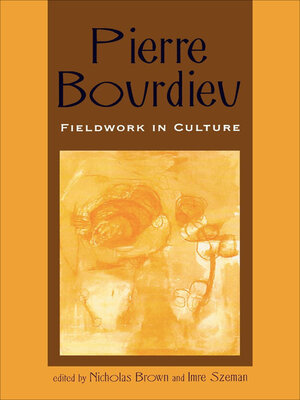
Sign up to save your library
With an OverDrive account, you can save your favorite libraries for at-a-glance information about availability. Find out more about OverDrive accounts.
Find this title in Libby, the library reading app by OverDrive.



Search for a digital library with this title
Title found at these libraries:
| Library Name | Distance |
|---|---|
| Loading... |
“The wide range of subjects . . . provides a glimpse of the extent to which Bourdieu’s theories of culture have gained widespread currency in the humanities.” —David Eick, SubStance
The work of Pierre Bourdieu, one of the most influential French intellectuals of the twentieth century, has had an enormous impact on research in fields as diverse as aesthetics, education, anthropology, and sociology. Pierre Bourdieu: Fieldwork in Culture is the first collection of essays to focus specifically on the contribution of Bourdieu’s thought to the study of cultural production. Though Bourdieu’s own work has illuminated diverse cultural phenomena, the essays in this volume extend to new cultural forms and to national situations outside France. Far from simply applying Bourdieu’s concepts and theoretical tools to these new contexts, the essays in this volume consider both the possibility and limits of Bourdieu’s sociology for the study of culture.
“Worth the attention of those who seek to become familiar with Bourdieu or to engage with a more well-rounded familiarity with the usefulness of his social theory.” —Christopher Lindsay Turner, MFS Modern Fiction Studies
“This sparkling and unusually coherent collection of essays emphasizes the American reception and adaptation of Bourdieu’s work. It shows how Bourdieu has been resisted and embraced and discusses how his terms and methods might be both used and modified by American academics. Theoretical reflections are productively complemented by empirical investigations of non-canonical and popular artistic expressions and by discussions of the position of women in Bourdieu’s thought.” —Marshall Brown, University of Washington
The work of Pierre Bourdieu, one of the most influential French intellectuals of the twentieth century, has had an enormous impact on research in fields as diverse as aesthetics, education, anthropology, and sociology. Pierre Bourdieu: Fieldwork in Culture is the first collection of essays to focus specifically on the contribution of Bourdieu’s thought to the study of cultural production. Though Bourdieu’s own work has illuminated diverse cultural phenomena, the essays in this volume extend to new cultural forms and to national situations outside France. Far from simply applying Bourdieu’s concepts and theoretical tools to these new contexts, the essays in this volume consider both the possibility and limits of Bourdieu’s sociology for the study of culture.
“Worth the attention of those who seek to become familiar with Bourdieu or to engage with a more well-rounded familiarity with the usefulness of his social theory.” —Christopher Lindsay Turner, MFS Modern Fiction Studies
“This sparkling and unusually coherent collection of essays emphasizes the American reception and adaptation of Bourdieu’s work. It shows how Bourdieu has been resisted and embraced and discusses how his terms and methods might be both used and modified by American academics. Theoretical reflections are productively complemented by empirical investigations of non-canonical and popular artistic expressions and by discussions of the position of women in Bourdieu’s thought.” —Marshall Brown, University of Washington







